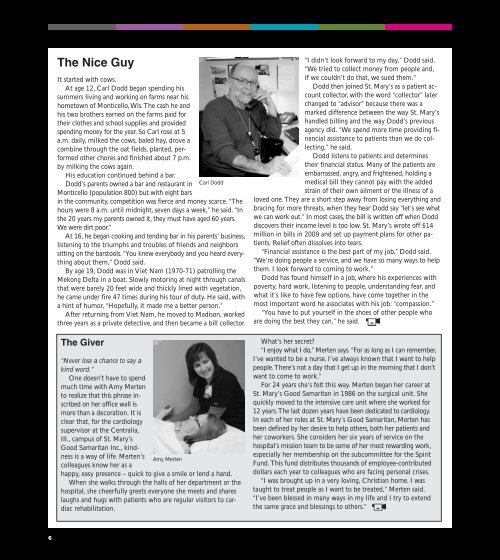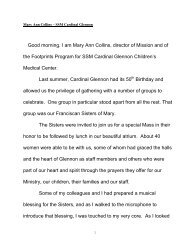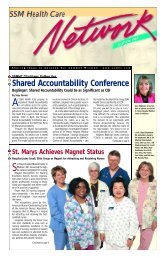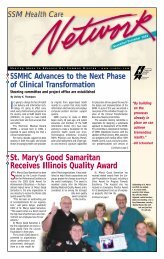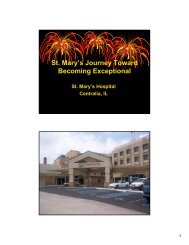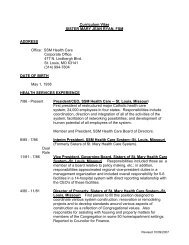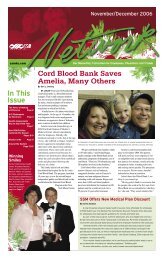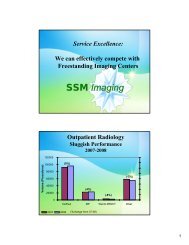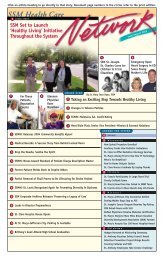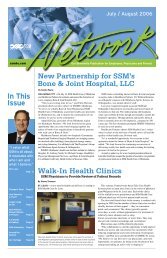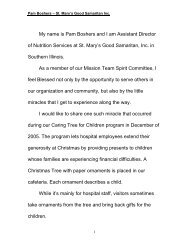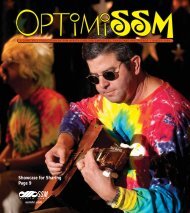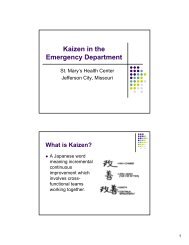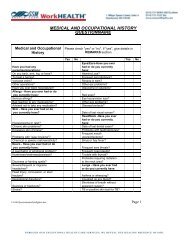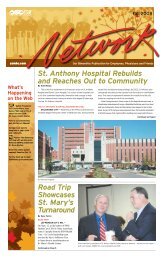Our People - SSM Health Care
Our People - SSM Health Care
Our People - SSM Health Care
Create successful ePaper yourself
Turn your PDF publications into a flip-book with our unique Google optimized e-Paper software.
The Nice Guy<br />
It started with cows.<br />
At age 12, Carl Dodd began spending his<br />
summers living and working on farms near his<br />
hometown of Monticello, Wis. The cash he and<br />
his two brothers earned on the farms paid for<br />
their clothes and school supplies and provided<br />
spending money for the year. So Carl rose at 5<br />
a.m. daily, milked the cows, baled hay, drove a<br />
combine through the oat fields, planted, performed<br />
other chores and finished about 7 p.m.<br />
by milking the cows again.<br />
His education continued behind a bar.<br />
Dodd’s parents owned a bar and restaurant in Carl Dodd<br />
Monticello (population 800) but with eight bars<br />
in the community, competition was fierce and money scarce. “The<br />
hours were 8 a.m. until midnight, seven days a week,” he said. “In<br />
the 20 years my parents owned it, they must have aged 60 years.<br />
We were dirt poor.”<br />
At 16, he began cooking and tending bar in his parents’ business,<br />
listening to the triumphs and troubles of friends and neighbors<br />
sitting on the barstools. “You knew everybody and you heard everything<br />
about them,” Dodd said.<br />
By age 19, Dodd was in Viet Nam (1970-71) patrolling the<br />
Mekong Delta in a boat. Slowly motoring at night through canals<br />
that were barely 20 feet wide and thickly lined with vegetation,<br />
he came under fire 47 times during his tour of duty. He said, with<br />
a hint of humor, “Hopefully, it made me a better person.”<br />
After returning from Viet Nam, he moved to Madison, worked<br />
three years as a private detective, and then became a bill collector.<br />
The Giver<br />
“Never lose a chance to say a<br />
kind word.”<br />
One doesn’t have to spend<br />
much time with Amy Merten<br />
to realize that this phrase inscribed<br />
on her office wall is<br />
more than a decoration. It is<br />
clear that, for the cardiology<br />
supervisor at the Centralia,<br />
Ill., campus of St. Mary’s<br />
Good Samaritan Inc., kindness<br />
is a way of life. Merten’s Amy Merten<br />
colleagues know her as a<br />
happy, easy presence – quick to give a smile or lend a hand.<br />
When she walks through the halls of her department or the<br />
hospital, she cheerfully greets everyone she meets and shares<br />
laughs and hugs with patients who are regular visitors to cardiac<br />
rehabilitation.<br />
“I didn’t look forward to my day,” Dodd said.<br />
“We tried to collect money from people and,<br />
if we couldn’t do that, we sued them.”<br />
Dodd then joined St. Mary’s as a patient account<br />
collector, with the word “collector” later<br />
changed to “advisor” because there was a<br />
marked difference between the way St. Mary’s<br />
handled billing and the way Dodd’s previous<br />
agency did. “We spend more time providing financial<br />
assistance to patients than we do collecting,”<br />
he said.<br />
Dodd listens to patients and determines<br />
their financial status. Many of the patients are<br />
embarrassed, angry, and frightened, holding a<br />
medical bill they cannot pay with the added<br />
strain of their own ailment or the illness of a<br />
loved one. They are a short step away from losing everything and<br />
bracing for more threats, when they hear Dodd say “let’s see what<br />
we can work out.” In most cases, the bill is written off when Dodd<br />
discovers their income level is too low. St. Mary’s wrote off $14<br />
million in bills in 2009 and set up payment plans for other patients.<br />
Relief often dissolves into tears.<br />
“Financial assistance is the best part of my job,” Dodd said.<br />
“We’re doing people a service, and we have so many ways to help<br />
them. I look forward to coming to work.”<br />
Dodd has found himself in a job, where his experiences with<br />
poverty, hard work, listening to people, understanding fear, and<br />
what it’s like to have few options, have come together in the<br />
most important word he associates with his job: “compassion.”<br />
“You have to put yourself in the shoes of other people who<br />
are doing the best they can,” he said.<br />
What’s her secret<br />
“I enjoy what I do,” Merten says. “For as long as I can remember,<br />
I’ve wanted to be a nurse. I’ve always known that I want to help<br />
people. There’s not a day that I get up in the morning that I don’t<br />
want to come to work.”<br />
For 24 years she’s felt this way. Merten began her career at<br />
St. Mary’s Good Samaritan in 1986 on the surgical unit. She<br />
quickly moved to the intensive care unit where she worked for<br />
12 years. The last dozen years have been dedicated to cardiology.<br />
In each of her roles at St. Mary’s Good Samaritan, Merten has<br />
been defined by her desire to help others, both her patients and<br />
her coworkers. She considers her six years of service on the<br />
hospital’s mission team to be some of her most rewarding work,<br />
especially her membership on the subcommittee for the Spirit<br />
Fund. This fund distributes thousands of employee-contributed<br />
dollars each year to colleagues who are facing personal crises.<br />
“I was brought up in a very loving, Christian home. I was<br />
taught to treat people as I want to be treated,” Merten said.<br />
“I’ve been blessed in many ways in my life and I try to extend<br />
the same grace and blessings to others.”<br />
6


